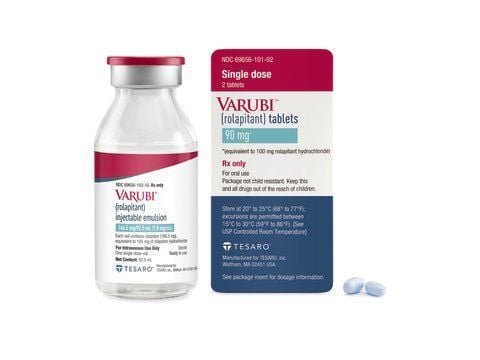This is an automatically translated article.
Nausea and vomiting in adults are common symptoms and can have many different causes. At this time, the use of antiemetics will help to cope with this situation. So when is the safest, most appropriate and effective antiemetic drug needed for adults? Follow the information below to know how to use antiemetics effectively when experiencing this condition.
1. Causes of vomiting
Vomiting is the process of pushing the contents of the stomach out due to involuntary contraction of the abdominal wall muscles when the gastric sphincter and lower esophageal sphincter are relaxed. In a nutshell, vomiting is a response of the digestive tract to push food waste in the stomach through the mouth.
Vomiting can originate from the gastrointestinal tract or central nervous system or can also be the result of a number of systemic conditions.
Common causes of nausea and vomiting can be due to:
Gastroenteritis . Use drugs. Toxic (food poisoning, lead exposure...). Travel sickness. Drink too much alcohol. Appendicitis . Acid reflux, gastroesophageal reflux. Food allergies... These are common causes of vomiting. In addition, there are a number of other causes of nausea and vomiting but are not so common. When experiencing nausea and vomiting, many people immediately think of taking anti-nausea drugs to overcome this situation.
2. How many antiemetics are there?
There are many different types of antiemetics for adults today. In it, people are divided into the following groups:
2.1. Serotonin receptor blocker antiemetics In terms of the main effect of the emetic mechanism, serotonin receptor blockers have the strongest antiemetic effect. Because, they have the ability to bind to serotonin receptors in the gut and in the brain. From there, inactivate the neural arc of the vomiting reflex from the gastrointestinal tract to the central nervous system.
This group of antiemetics is specifically used to prevent vomiting in cases of surgery, cancer treatment or chemotherapy.
2.2. Dopamine Inhibitors Antiemetics for adults belong to the group of dopamine inhibitors that act on the central nervous system. This group is resistant to vomiting because they inactivate the activity of the vomiting nerve related to dopamine.
This group is divided into two subgroups, which are dopamine inhibitors in the gastrointestinal tract and dopamine inhibitors in the brain. This inhibition helps to reduce intestinal motility and does not have a contractile response to induce vomiting.
2.3. Antihistamines Antihistamines are the most commonly used antiemetics in practice. Antihistamines inhibit histamine receptors in the gastrointestinal tract. The drug reduces gastric motility and reduces intestinal motility mainly, thereby creating an antiemetic effect.
Drugs commonly used against vestibular vomiting, dizziness, motion sickness or similar vomiting manifestations.
2.4. Cannabinoid derivatives (derivatives of morphine) Another class of antiemetics that are also commonly used daily are cannabinoid derivatives, also known as morphine derivatives.
This group of drugs has the effect of reducing intestinal motility and reducing digestive secretions, and at the same time reducing the reverse motility reaction of the gastrointestinal tract, so it should have an antiemetic effect.
However, the antiemetic effect of this group of drugs is not strong, but the effect of reducing diarrhea is stronger. The drug is often used as an adjunct in the treatment of vomiting caused by infection, food poisoning.
In addition to the 4 groups of drugs to treat vomiting in adults mentioned above, there are still some other groups of antiemetics such as: neurokinin 1 receptor blockers, anti-inflammatory drugs and corticosteroids.
3. So when to use antiemetics for adults?
The appropriate time to take antiemetics for adults will effectively prevent vomiting.
To have a strong antiemetic effect, you need to take the drug at least 30 minutes before vomiting occurs. This is the minimum time required for receptor blockade drugs to produce a safe antiemetic response.
Therefore, to prevent vomiting caused by trains, you should take medicine 30 minutes before the train departs. If you are afraid of vomiting after surgery, you need to take anti-emetics 1 hour before surgery. Sometimes, the oral route is not strong enough, and the doctor will find an alternative injection.
In cases of vomiting caused by food poisoning or food poisoning, you should only take anti-nausea medication after the pathogens or toxins have been eliminated. Usually, after the first 2 vomiting times, the poisons have been eliminated from the stomach, now taking medicine will minimize the accumulation of toxins in the stomach.
In cancer therapy, the vomiting response is stronger and oral therapy for vomiting is sometimes ineffective, the doctor may consider and resort to injection therapy. To prevent vomiting effectively, you need to take antiemetics 1 hour before treatment and continue taking 1-2 hours after treatment.
When combined antiemetic drugs are more effective than single drug alone. Therefore, in some cases, a combination of antiemetics is considered. Therefore, right after 1 hour of taking antiemetics and still having symptoms of vomiting, you need to immediately notify your doctor for appropriate adjustment. The doctor may prescribe a combination of 1 or 2 other drugs to quickly achieve an antiemetic effect.
4. Side effects of antiemetics for adults
Each group of antiemetics when used will often encounter different side effects, including:
Antihistamines often have side effects causing drowsiness, dry nose and dry mouth. Corticosteroids can increase appetite, acne, and thirst. Dopamine receptor blockers often cause side effects such as fatigue, constipation, ringing in the ears, dry mouth, restlessness, and muscle spasms. Neurokinin 1 (NK1) receptor blockers cause side effects of dry mouth, decreased urine output, and heartburn. Serotonin receptor blockers often have side effects such as fatigue, dry mouth and constipation... During the use of antiemetic drugs, some complications may occur such as: Spasms or convulsions. , muscle weakness, change in heart rate, hearing loss, drowsiness, hallucinations, confusion...
Attention: If you experience any of the above side effects while taking antiemetics, please call your doctor immediately. for advice and guidance, specifying how to handle it in a timely manner.
5. Drug interactions of antiemetics for adults
Antiemetics used for adults can interact with some other medications, increasing the side effects of the medication being taken. Therefore, before taking antiemetics, you should tell your doctor about the drugs you are taking so that your doctor can advise and prescribe appropriate drugs to avoid adverse interactions.
Drugs that can interact with antiemetics include: arthritis drugs, sleeping pills, antidepressants, blood thinners...
During the use of antiemetics if you encounter any effects drug side effects or drug complications. Then you need to immediately notify the doctor for specific advice or go to the doctor immediately for timely and appropriate treatment.
Above is information about antiemetics for adults. Hope this information has helped people know when to take antiemetics? From there, know how to use antiemetics properly and achieve the best antiemetic effect.
Please dial HOTLINE for more information or register for an appointment HERE. Download MyVinmec app to make appointments faster and to manage your bookings easily.













